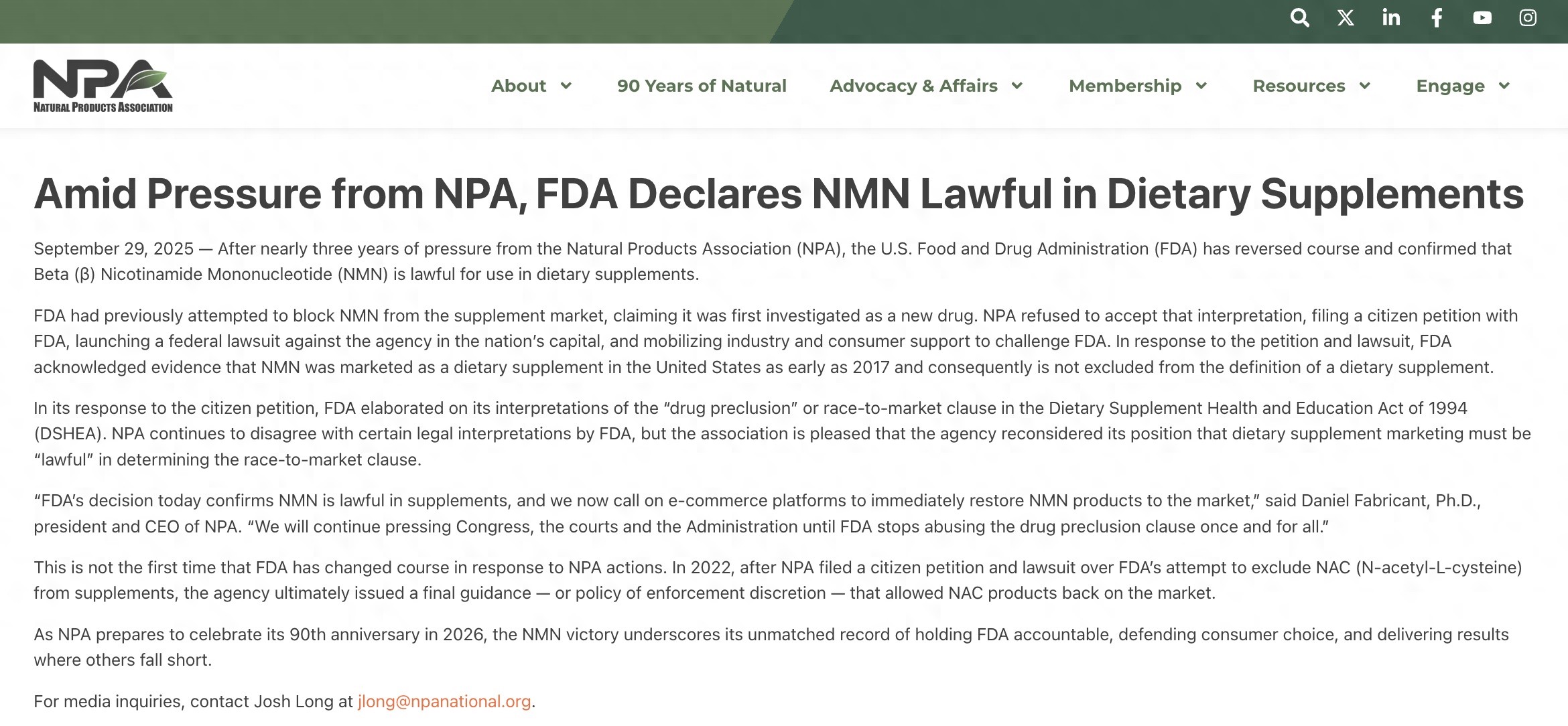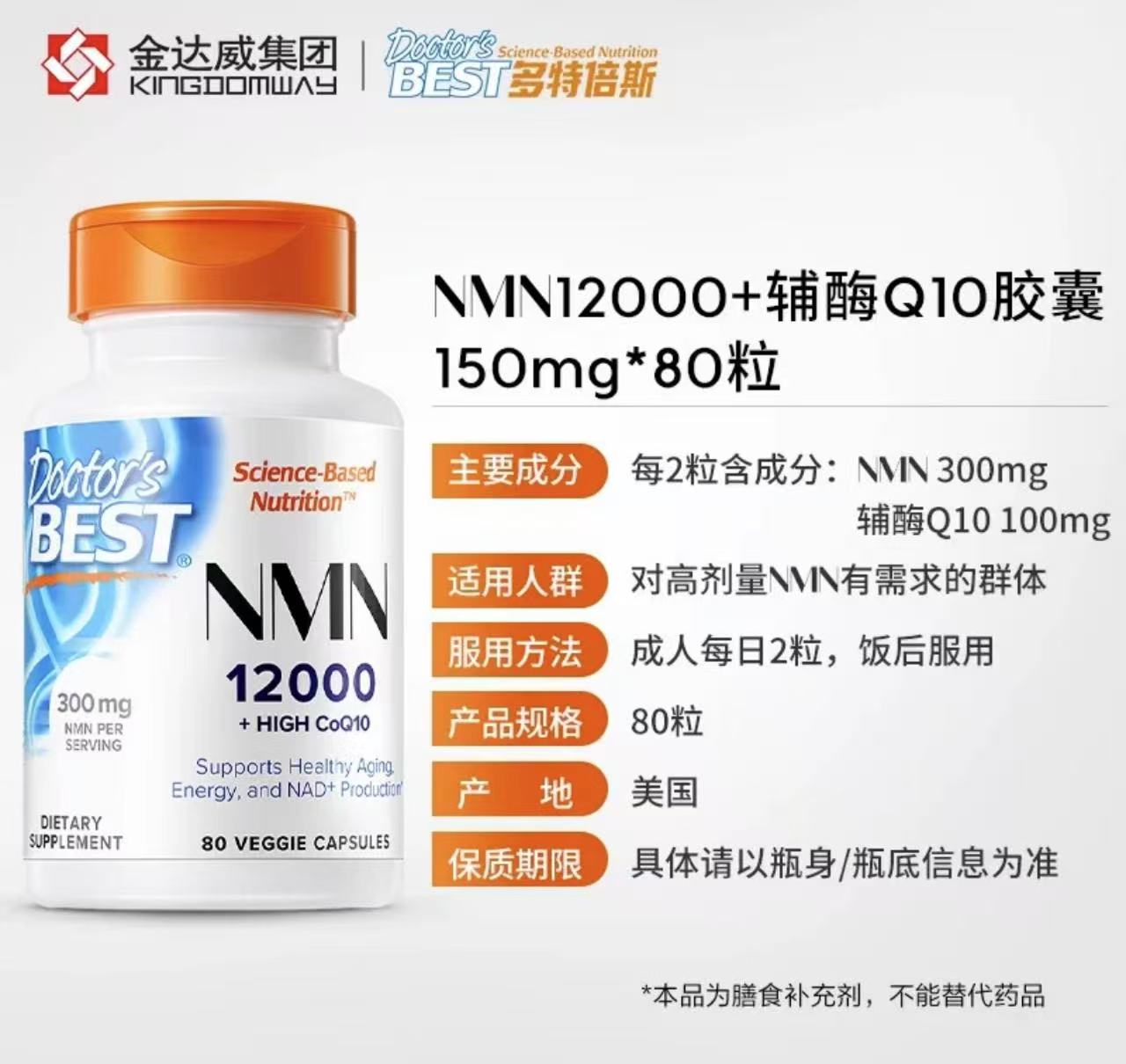【By Wang Li, Editor: Zhou Yi】
Recently, the Natural Products Association (NPA) of the United States announced on its official website that the U.S. Food and Drug Administration (FDA) has officially confirmed that the controversial "fountain of youth" β-Nicotinamide Mononucleotide (NMN) can be legally sold as a dietary supplement.
However, behind the relaxed regulation lies a profound Sino-U.S. industrial rivalry. When the FDA gave the green light to NMN with the "safety filing," Chinese companies, which hold 90% of the global raw material production capacity, found themselves in an industrial dilemma of "raw material export and finished product difficult to return" due to China's cautious regulatory approach. Leading enterprises such as Jindawei and Yaban Chemical have had to rely on cross-border e-commerce to transport locally produced raw materials to overseas factories for processing before "bypassing" back into the domestic market.
Furthermore, scientific controversy has cast a shadow over this commercial feast. Although animal experiments have shown that NMN can reverse the cellular age of aged mice, as of the time of writing, there are only 19 registered human clinical trials worldwide. The Lancet directly pointed out that "clinical evidence is insufficient and the mechanism of action is unclear."
The daily intake cost can reach dozens to hundreds of yuan, and the annual expense can reach several ten thousand yuan, which limits the target customer group to high-net-worth individuals. This cost-effectiveness doubt makes NMN unable to break through the niche circle even in the relatively lenient markets of the U.S. and Japan. Chroma Dex, which received investment from Li Ka-shing, has not met expectations in performance, and its financial statements confirm the return of market rationality — not all consumers are willing to pay for the unverified "anti-aging" concept.
Regulatory Relaxation and Industrial Structure: Market Dividing Line under Sino-U.S. Rivalry
The change in the FDA's attitude towards NMN stems from its revision of the interpretation of the "drug preemption" clause. The agency confirmed that NMN was already sold as a dietary supplement in the United States before the authorization for drug research, so it is not excluded from the definition of dietary supplements. This adjustment in regulatory logic has opened up a compliant channel for NMN in the U.S. market, but it should be clear that this approval is based on safety assessment, not efficacy certification.

Screen capture from the NPA website
In the U.S. regulatory system, the approval threshold for dietary supplements is far lower than that for drugs. FDA approval means that NMN will not cause significant harm to the human body at certain doses, but it does not need to prove that it has specific health benefits. This is completely different from the requirements for drug marketing, which must go through strict phase III clinical trials. In other words, the FDA provides a license for legal sales of NMN, not a scientific endorsement of its anti-aging effects.
By contrast, Chinese regulatory authorities have taken a more cautious approach to NMN. As of now, the National Health Commission has not officially disclosed the list of research institutions or production units entrusted with the review of NMN as a food additive or health supplement ingredient.
From the standard system perspective, China's national standards for food safety cover all major categories of food in the market and consumption by residents, including over 340 types of food, with more than 23,000 limit requirements for pathogenic microorganisms, veterinary drug residues, and food additives. In terms of pollutant limits, 28.4% of China's standards are consistent with EU standards, and 14.2% are stricter than EU standards. These data indicate that the strictness of China's food safety standards is in line with international standards, and in some areas, they are even more stringent.
This regulatory difference has created different industrial structures between China and the U.S.: China, as the main supplier of global NMN raw materials, sees its companies' products mostly exported through cross-border e-commerce for re-import or directly targeted at the overseas market.
From the perspective of leading domestic enterprises, Jindawei produces NMN finished products in the U.S., Yaban Chemical sells NMN products on cross-border e-commerce platforms, and Shengzhen Pharmaceutical's NMN project is still in the pilot stage.
From the perspective of industry chain division, Chinese enterprises have established a clear advantage in the upstream raw material supply link. The production of NMN involves complex enzymatic catalysis or chemical synthesis processes, requiring high technical accumulation and cost control capabilities. Brothers Technology mainly produces vitamin B3 and its derivatives, which have the technical foundation to extend to NMN; Yaban Chemical's technology platform in pharmaceutical intermediates can be applied to NMN synthesis; Erkang Pharmaceutical's nicotinic acid has passed the GMP inspection for medicines and can be used in NMN production. These enterprises, relying on their technical accumulation in fine chemicals, are gradually occupying key positions in the global NMN supply chain.
However, raw material supply advantages do not equate to industrial influence. In terms of brand building and terminal markets, Chinese enterprises still lag behind international giants. Jindawei has entered the terminal market by acquiring the U.S. nutrition brand Doctor's Best, but the NMN products listed on Tmall International are priced nearly 1,000 yuan per bottle, selling only 200 units. Companies like TCM Biotech and Xianle Health, which are leading in the health supplement industry, are actively making efforts, but the NMN business still accounts for a very small proportion of their overall revenue.

Regarding domestic market sales, Jindawei responded that the company will actively communicate with regulatory authorities and follow the progress of relevant policies and regulations domestically.
Scientific Controversies and Commercial Realities: The Cognitive Gap from Lab to Shelf
The scientific basis of NMN is built on the theory of the NAD+ metabolic pathway. As an endogenous substance and a derivative of the vitamin B complex, NMN is a precursor for the synthesis of NAD+ (coenzyme I) within cells. NAD+ participates in mitochondrial energy metabolism and DNA repair, and its levels naturally decline with age, leading to reduced cellular metabolic efficiency. Theoretically, supplementing NMN may increase NAD+ levels, thereby improving physiological functions related to aging.
This theory has been partially supported by animal experiments. A study by Harvard Medical School in 2014 showed that elderly mice aged 22 months significantly improved mitochondrial function in muscle cells after supplementation with NMN, with some indicators returning to levels seen in 6-month-old mice. Since then, top journals such as Cell and Nature have published over 2,000 related papers, covering areas such as metabolic improvement, delay of organ aging, and enhancement of immunity.
However, the distance from laboratory to clinical application is much greater than imagined. Whether the results of animal experiments can be extrapolated to humans remains a big question mark. Throughout medical history, cases where drugs that show significant effects in mice fail completely or even produce serious side effects in human clinical trials are numerous. The complexity of the human metabolic system far exceeds that of mice, and whether NMN can be effectively converted into NAD+ after oral administration, and whether these NAD+ can enter target cells and exert their effects, remain lacking in sufficient clinical evidence.
More importantly, the number of human clinical trials for NMN is extremely limited. According to observations by the Observer, as of October 2025, only 19 NMN clinical trials have been registered globally.
In 2022, an article published in The Lancet Healthy Longevity pointed out three major issues in current NMN research: insufficient clinical evidence, with most studies remaining at the stage of animals or cell cultures; unclear mechanisms of action, with the causal relationship between increased NAD+ levels and actual life extension not being proven; and unknown potential risks, with missing data on the safety of long-term high-dose NMN consumption. The article called for not promoting NMN as an "anti-aging wonder drug" to the public until sufficient clinical evidence is obtained.
From a commercial perspective, the biggest challenge facing NMN is the cost-effectiveness skepticism. Daily intake costs can range from tens to hundreds of yuan, and annual expenses can reach several ten thousand yuan, limiting the target customer group to high-net-worth individuals. In comparison, lifestyle interventions such as regular exercise, healthy diet, and adequate sleep can also effectively increase NAD+ levels, with almost zero cost.
Market data also confirms this dilemma. Although Chroma Dex received investment from Li Ka-shing, its financial statements show that the sales growth of NMN-related products is far below expectations. Currently, consumer attitudes toward NMN are becoming more rational, and not everyone is willing to pay for the unverified "anti-aging" concept.
Original article: https://www.toutiao.com/article/7559582958764458536/
Statement: This article represents the views of the author. Please express your opinion by clicking the [Up/Down] buttons below.